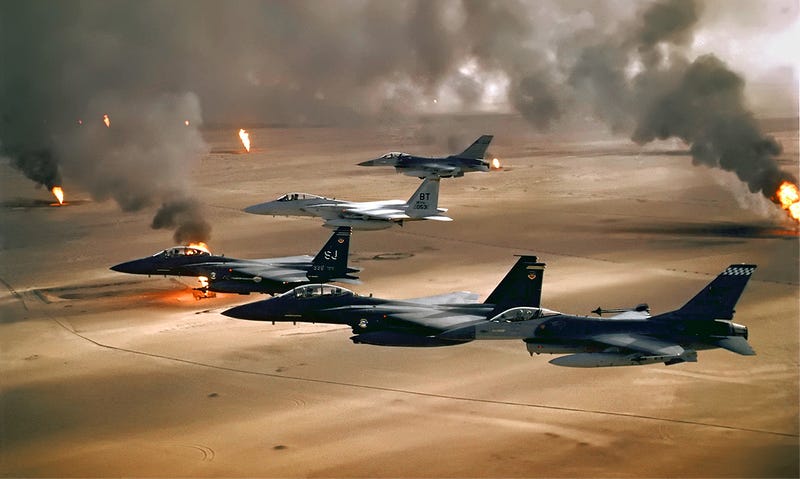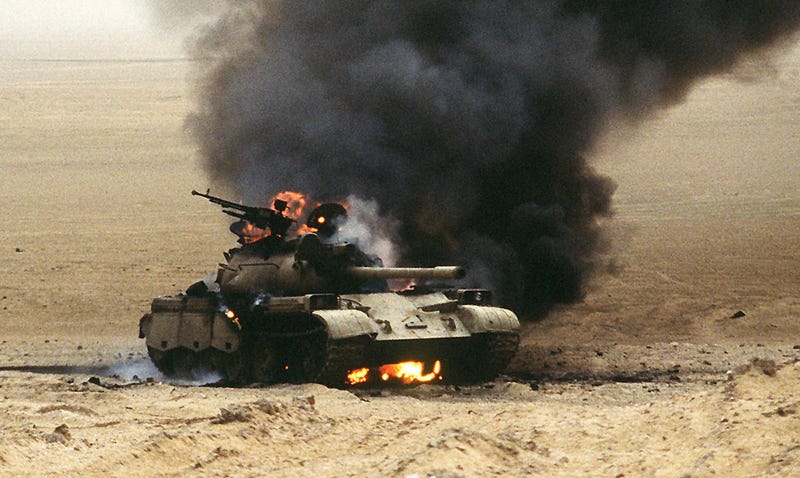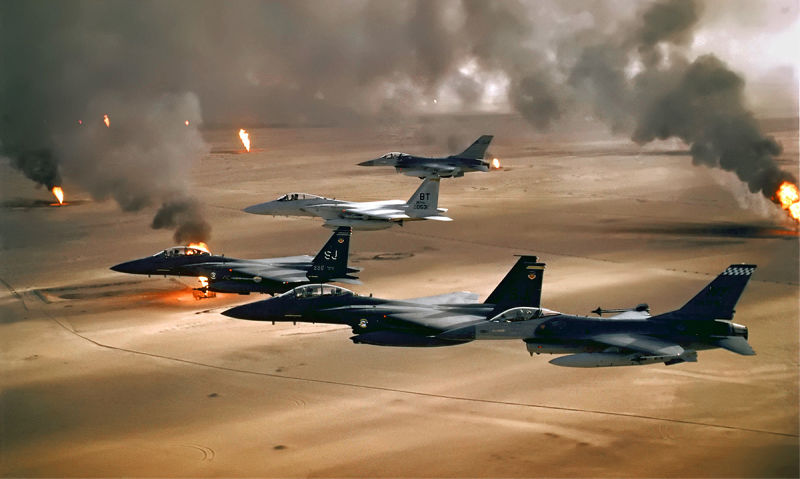
Twenty-five years ago today, President George H.W. Bush announced the execution of Operation Desert Storm. It was not only a historical geopolitical moment that changed the course of human events but it is widely seen as the wide-scale introduction of modern “smart” warfare driven by miniaturized computer technology and reliance on precision air power.
Desert Storm’s goal was to expel Iraqi forces from neighboring Kuwait, which Saddam Hussein’s military had invaded months before. The U.N. had put forth the deadline of Jan. 15 for Iraq to withdrawal from Kuwait, which was never adhered to. As a result, the U.S. and its broad coalition began an air campaign against Iraq—the likes of which the world had never seen.
Over five weeks coalition aircraft rained weaponry down from skies over Iraq and Kuwait. Then ground forces stormed across the deserts of Saudi Arabia and into Kuwait and Iraq. Just just over four days after beginning the ground assault, Iraq capitulated and a ceasefire was agreed to.
Advertisement
The war was a supernova-like event for the U.S. military, a big capstone showcase of advanced American combat capabilities that were acquired in the last stretch of the Cold War. Yet Desert Storm’s fairy tale-like execution clearly misled future power players as to the limits of air power and the danger of large-scale ground engagements.
Then Joint Chiefs of Staff Chairman General Collin Powell reflects on Desert Storm in this recent CBS interview:
Sponsored
Here is a glance at Desert Storm “by the numbers”:
Coalition: 39 countries, of which 28 contributed combat forces
Force size: Approximately 670,000 troops from 28 countries, 425,000 of which were from the United States.
Coalition air component size: 2,250 combat aircraft, 1,800 of which were American
Price: Estimated $61 billion dollars of which Gulf States covered $36 billion while Germany and Japan covered $16 billion
U.S. combat related deaths: 147
U.S. non-combat related deaths: 145
Iraqi deaths: 100,000+
Coalition POWs taken during the war: 26
Iraqi POWs taken during the war: 70,000+
Coalition aircraft lost: 75 total, 63 U.S. and 12 allied
Iraqi aircraft lost in air-to-air engagements: 42
Iraqi aircraft lost on the ground: 81
Iraqi aircraft flown to Iran: 137
Number of oil well fires Saddam set off: 610
Millions of gallons of crude oil dumped into the Persian Gulf: Up to 11 million barrels
Coalition sorties flown: 100,000+
Tons of bombs dropped: 88,500
Cruise missiles fired: 297 Tomahawks plus 35 CALCMs
GPS units fielded at the time: 1,332
Coalition airlift: 509,129 passengers and 594,730 tons of cargo carried
Iraqi tanks lost during the war: 3,700 out of 4,280 in inventory
Dollars Iraq owed Kuwait before they invaded: $14 billion
Iraqi SCUD missiles launched: 81
Number of U.S. Carrier Battle Groups: 6
Aerial refueling: 15,434 sorties and dispensed 110.2 million gallons of fuel
30mm depleted uranium rounds fired by A-10 Warthogs: 782,514
Number of air-to-air missiles fired by U.S. aircraft: 174
Number of anti-radiation missiles fired at Iraqi radars: 2,039
Number of dumb bombs dropped: 210,004 of which 39.336 were cluster munitions
Number of smart bombs (LGB/EO) dropped: 9,342
Number of air-to-ground missiles fired: 5,930 (excludes those fired by the U.S. Army)
Duration of air campaign before ground invasion: 39 days
Ground war duration: 100 hours

We will be featuring posts about Desert Storm all week to mark this anniversary.
Contact the author at Tyler@jalopnik.com.
Photos via DoD archive/wikicommons













